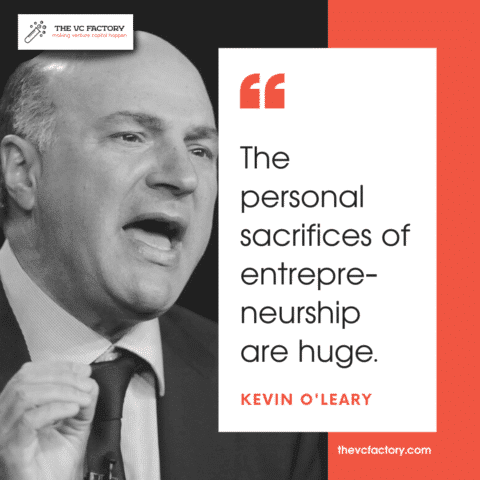“The personal sacrifices of entrepreneurship are huge.” — Kevin O’Leary

Kevin O’Leary, best recognized for his role as an Investor on the hugely successful TV show “Shark Tank,” has earned his moniker ‘Mr. Wonderful’ for his candid and often brash demeanor. He never fails to entertain, amuse, and sometimes even provoke viewers with his straightforward approach. At an Inc.com event in 2017, he delved deep into the real challenges entrepreneurs must brace for.
His insights can be interpreted in two distinct ways. Some may criticize O’Leary for his raw candor, believing that entrepreneurs should be uplifted, not deterred. Yet, others, including myself, commend him for providing a reality check to those dreaming of entrepreneurship. It not a path that for everyone, and is fraught with psychological and physiological harm.
I’ve been researching the mental well-being of entrepreneurs for years, as part of a Doctorate in Business Administration (DBA). My perspective blends both scholarly research and nearly 15 years of firsthand observations of entrepreneurs, both as an investor and advisor. What follows is drawn from my research.
Help me better understand how entrepreneurs manage stress and preserve mental health. Participate in my study underpinned by four years of academic research for my Doctorate in Business Administration. Please click here to access the survey.
Why Entrepreneurs Underestimate future Obstacles
Entrepreneurs frequently underestimate the sacrifices required for success, often caught in the grip of two pervasive influences.
Firstly, overconfidence can cloud their judgment, making them believe that they’ll be the exception, swiftly overcoming challenges that others falter at. I wrote about this phenomenon in this post. Overconfidence is a double-edged sword: while it is necessary in entrepreneurship to dare do something everyone else think impossible, it can spiral into carelenessness if left unchecked.
Secondly, there are not sufficient accounts of entrepreneurs’ challenges. The media often paints a rosy picture of entrepreneurial triumphs, glamorizing success stories while glossing over the hardships, sleepless nights, and personal tolls. This skewed representation can create a facade of ease and allure, leaving out the gritty realities of the entrepreneurial journey.
Many other personality traits and cognitive biases contribute to this underestimating phenomenon. Asking other entrepreneurs could resolve part of the issue, but it is not bulletproof. Many successful entrepreneurs unconsciously forget past difficulties or give advice that is not valid for others’ specific contexts.
Nobody told me. Screw him.
Saturday night live (source: YOUTUBE)
Another cause is that some entrepreneurs are not forthwith with sharing their past difficulties.
In a hilarious 1998 Saturday Night Live sketch, Will Ferrell and Vince Vaughn enlighten a soon-to-be-married Jimmy Fallon about the joys of married life. “You’ll stop fighting, sex is unbelievable, and you’ll love your wife’s relatives” are some of the truths they impart on an astounded Fallon. As future groom leaves the bar for a bathroom break, Vaughn goes: “Shall we tell him the truth?” Ferrell then brilliantly delivers the punchline. Nobody told him, so he will not tell others.
Several psychological factors might drive entrepreneurs to withhold sharing past difficulties with their peers:
- Ego Protection: Admitting to difficulties can be perceived as admitting weakness or failure. Some entrepreneurs might fear that discussing challenges could tarnish their image as a successful businessperson.
- Survivorship Bias: Entrepreneurs who have overcome significant challenges and achieved success might develop a belief that enduring such hardships was a necessary rite of passage. They might think, “I made it through, so others should too without any hand-holding.”
- Competitive Nature: Most entrepreneurs are inherently competitive. Some entrepreneurs might believe that by not sharing information about pitfalls, they maintain a competitive edge, making the journey harder for potential competitors.
What are the sacrifices Kevin O’Leary has in mind?
O’Leary debunks persistent myths surrounding the entrepreneurial journey, starting with the expectation that creating a company is a way to quickly become wealthy. The reality, he warns, is starker: 8 out of 10 entrepreneurs fail, those who succeeed have to launch several companies before one survives, It takes a decade or even 15 years to get an exit.
The impact on the business owner’s personal life is tremendous. O’Leary cautions that there is no free time to spend with loved ones. Entrepreneurship is not for everybody.
Don’t become an entrepreneur if you don’t have the stamina to get kicked around and driven into the ground, and get up and do it again.
Kevin O’Leary
One of the first academic articles I read on this subject when I started my entrepreneurship journey is a luminary account by two U.S. researchers, David Boyd and David Gumpert, dated from 1983. They identify causes of entrepreneurial stress, including uncertainty, time pressure, and isolation.
But the most shocking parts of the paper are the verbatim from entrepreneurs they interviewed, revealing business owners who take no vacation, have a hard time relaxing even at home, suffer from frequent ulcers and insomnia, and feel like their venture will be harmed if they take their eyes off the ball.
Anyone who went through 12 months of entrepreneurship will recognize these symptoms. Please share them with newcomers in this gratifying but challenging path.
Here’s the interview with Kevin O’Leary.
